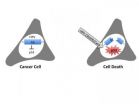(Press-News.org) WASHINGTON –- Frequent marijuana use can have a significant negative effect on the brains of teenagers and young adults, including cognitive decline, poor attention and memory, and decreased IQ, according to psychologists discussing public health implications of marijuana legalization at the American Psychological Association's 122nd Annual Convention.
"It needs to be emphasized that regular cannabis use, which we consider once a week, is not safe and may result in addiction and neurocognitive damage, especially in youth," said Krista Lisdahl, PhD, director of the brain imaging and neuropsychology lab at University of Wisconsin-Milwaukee.
Marijuana use is increasing, according to Lisdahl, who pointed to a 2012 study showing that 6.5 percent of high school seniors reported smoking marijuana daily, up from 2.4 percent in 1993. Additionally, 31 percent of young adults (ages 18 to 25) reported using marijuana in the last month. People who have become addicted to marijuana can lose an average of six IQ points by adulthood, according to Lisdahl, referring to a 2012 longitudinal study of 1,037 participants who were followed from birth to age 38.
Brain imaging studies of regular marijuana users have shown significant changes in their brain structure, particularly among adolescents, Lisdahl said. Abnormalities in the brain's gray matter, which is associated with intelligence, have been found in 16- to 19-year-olds who increased their marijuana use in the past year, she said. These findings remained even after researchers controlled for major medical conditions, prenatal drug exposure, developmental delays and learning disabilities, she added.
"When considering legalization, policymakers need to address ways to prevent easy access to marijuana and provide additional treatment funding for adolescent and young adult users," she said. She also recommended that legislators consider regulating levels of tetrahydrocannabinol, or THC, the major psychoactive chemical in marijuana, in order to reduce potential neurocognitive effects.
Some legalized forms of marijuana have higher levels of THC than other strains, said Alan Budney, PhD, of Dartmouth College. THC is responsible for most of marijuana's psychological effects. Some research has shown that frequent use of high potency THC can increase risk of acute and future problems with depression, anxiety and psychosis. "Recent studies suggest that this relationship between marijuana and mental illness may be moderated by how often marijuana is used and potency of the substance," Budney said. "Unfortunately, much of what we know from earlier research is based on smoking marijuana with much lower doses of THC than are commonly used today." Current treatments for marijuana addiction among adolescents, such as brief school interventions and outpatient counseling, can be helpful but more research is needed to develop more effective strategies and interventions, he added.
Additionally, people's acceptance of legalized medical marijuana use appears to have an effect on adolescents' perception of the drug's risks, according to Bettina Friese, PhD, of the Pacific Institute for Research and Evaluation in California. She presented results from a 2013 study of 17,482 teenagers in Montana, which found marijuana use among teenagers was higher in counties where larger numbers of people voted to legalize medical marijuana in 2004. In addition, teens in counties with more votes for the legalization of medical marijuana perceived marijuana use to be less risky. The research findings suggest that a more accepting attitude toward medical marijuana may have a greater effect on marijuana use among teens than the actual number of medical marijuana licenses available, Friese said.
INFORMATION:
Session 3163: "Considering Cannabis? Potential Public Health Implications of Marijuana Legalization," Symposium, Saturday, 10 a.m. to 11:50 a.m. EDT, Room 150B, Walter E. Washington Convention Center, 801 Mount Vernon Pl., NW, Washington, D.C.
Presentations are available from the APA Public Affairs Office.
Presentations and Contact Information
"Neurocognitive Consequences of Chronic Marijuana Use: Preventing Early Onset Is Critical"
Krista Lisdahl
krista.medina@gmail.com
(414) 229-7159 (office) or (262) 290-7646 (cell)
"Clinical Epidemiology, Characteristics, Services and Outcomes for Youth With Cannabis-Use Disorders"
Alan Budney
Alan.J.Budney@dartmouth.edu
(603) 653-1821 (office)
"Is Legalization of Medical Marijuana Related to Youths' Marijuana Beliefs and Behaviors?"
Bettina Friese
bfriese@prev.org
(510) 883-5716
The American Psychological Association, in Washington, D.C., is the largest scientific and professional organization representing psychology in the United States. APA's membership includes nearly 130,000 researchers, educators, clinicians, consultants and students. Through its divisions in 54 subfields of psychology and affiliations with 60 state, territorial and Canadian provincial associations, APA works to advance the creation, communication and application of psychological knowledge to benefit society and improve people's lives.
Regular marijuana use bad for teens' brains
Psychology and public health experts weigh in on potential effects of legalization on youth
2014-08-09
ELSE PRESS RELEASES FROM THIS DATE:
Individual genotype influences effectiveness of HIV vaccine
2014-08-09
Almost 40 million people worldwide live with HIV/AIDS. Despite great effort, HIV-1 vaccine development has been challenging. A recent HIV vaccine trial, known as RV144, revealed that a combination of 2 vaccines protected some individuals from HIV infection. Individuals in the trial that made antibodies that bound to a specific region of the HIV envelope protein had a decreased risk of HIV infection. A new study in the Journal of Clinical Investigation reveals that an individual's genotype correlates with their ability to develop immunity to HIV in response to vaccination. ...
Improving lymphatic function protects mice from experimental colitis
2014-08-09
Chronic inflammatory bowel disease can be painful and debilitating. Both genetics and environment are thought to promote disease, but it is not fully understood how chronic IBD develops. Emerging evidence indicates that IBD is associated with an increase in lymphatic vasculature, which transports lymph throughput the body. It is not clear if these lymphatic vessels promote or improve IBD. A new study in the Journal of Clinical Investigation indicates that improving lymphatic function relieves experimental IBD in mice. Silvio Danese and colleagues at Humanitas Clinical and ...
Lead linked to obesity in mice exposed by mothers
2014-08-08
ANN ARBOR—When we think of ill effects from lead exposure various neurologic problems usually come to mind. Now researchers at the University of Michigan say another health impact can be added to the list: obesity.
Even at low levels, lead is associated with obesity in mice whose mothers were exposed to the chemical, researchers at the U-M School of Public Health found. Specifically male mice exposed to lead had an 8-10 percent increase in weight.
"The data support the obesogen hypothesis that toxicant exposures in the womb contribute to the higher rate of obesity," ...
Disney Researchers develop method to capture stylized hair for 3-D-printed figurines
2014-08-08
Perhaps no aspect of 3D printing has captured the popular imagination more than personalized figurines with the facial features of real people. Now, researchers at Disney Research Zurich and the University of Zaragoza have developed a method that can incorporate an individual's hairstyle as well.
The researchers will present their new method at ACM SIGGRAPH 2014, the International Conference on Computer Graphics and Interactive Techniques in Vancouver, Aug. 10-14.
Miniature statues with a person's likeness are nowadays produced by scanning the individual's face with ...
Expecting to teach enhances learning, recall
2014-08-08
"When compared to learners expecting a test, learners expecting to teach recalled more material correctly, they organized their recall more effectively and they had better memory for especially important information," said lead author John Nestojko, PhD, a postdoctoral researcher in psychology in Arts & Sciences at WUSTL.
The study, published recently in the journal Memory & Cognition, is based on a series of reading-and-recall experiments in which one group of students is told they will be tested on a selection of written material, and another group is led to believe ...
Water's reaction with metal oxides opens doors for researchers
2014-08-08
MADISON, Wis. — A multi-institutional team has resolved a long-unanswered question about how two of the world's most common substances interact.
In a paper published recently in the journal Nature Communications, Manos Mavrikakis, professor of chemical and biological engineering at the University of Wisconsin-Madison, and his collaborators report fundamental discoveries about how water reacts with metal oxides. The paper opens doors for greater understanding and control of chemical reactions in fields ranging from catalysis to geochemistry and atmospheric chemistry.
"These ...
Editing HPV's genes to kill cervical cancer cells
2014-08-08
DURHAM, N.C. -- Researchers have hijacked a defense system normally used by bacteria to fend off viral infections and redirected it against the human papillomavirus (HPV), the virus that causes cervical, head and neck, and other cancers.
Using the genome editing tool known as CRISPR, the Duke University researchers were able to selectively destroy two viral genes responsible for the growth and survival of cervical carcinoma cells, causing the cancer cells to self-destruct.
The findings, appearing online August 7 in the Journal of Virology, give credence to an approach ...
UK study shows promise for new nerve repair technique
2014-08-08
LEXINGTON, Ky. (Aug. 8, 2014) – A multicenter study including University of Kentucky researchers found that a new nerve repair technique yields better results and fewer side effects than other existing techniques.
Traumatic nerve injuries are common, and when nerves are severed, they do not heal on their own and must be repaired surgically. Injuries that are not clean-cut – such as saw injuries, farm equipment injuries, and gunshot wounds – may result in a gap in the nerve.
To fill these gaps, surgeons have traditionally used two methods: a nerve autograft (bridging ...
Ancient shellfish remains rewrite 10,000-year history of El Nino cycles
2014-08-08
The planet's largest and most powerful driver of climate changes from one year to the next, the El Niño Southern Oscillation in the tropical Pacific Ocean, was widely thought to have been weaker in ancient times because of a different configuration of the Earth's orbit. But scientists analyzing 25-foot piles of ancient shells have found that the El Niños 10,000 years ago were as strong and frequent as the ones we experience today.
The results, from the University of Washington and University of Montpellier, question how well computer models can reproduce historical El ...
Kessler Foundation scientists confirm effectiveness of cognitive rehabilitation in MS
2014-08-08
WEST ORANGE, NJ August 8, 2014. Kessler Foundation researchers published long-term followup results of their MEMREHAB trial, which show that in individuals with MS, patterns of brain activity associated with learning were maintained at 6 months post training. The article, A pilot study examining functional brain activity 6 months after memory retraining in MS: the MEMREHAB trial, was published online ahead of print on June 14 by Brain Imaging and Behavior (doi: 10.1007/s11682-014-9309-9). The article appeared in the Neuroimaging and Rehabilitation Special Issue. The authors ...
LAST 30 PRESS RELEASES:
DEGU debuts with better AI predictions and explanations
‘Giant superatoms’ unlock a new toolbox for quantum computers
Jeonbuk National University researchers explore metal oxide electrodes as a new frontier in electrochemical microplastic detection
Cannabis: What is the profile of adults at low risk of dependence?
Medical and materials innovations of two women engineers recognized by Sony and Nature
Blood test “clocks” predict when Alzheimer’s symptoms will start
Second pregnancy uniquely alters the female brain
Study shows low-field MRI is feasible for breast screening
Nanodevice produces continuous electricity from evaporation
Call me invasive: New evidence confirms the status of the giant Asian mantis in Europe
Scientists discover a key mechanism regulating how oxytocin is released in the mouse brain
Public and patient involvement in research is a balancing act of power
Scientists discover “bacterial constipation,” a new disease caused by gut-drying bacteria
DGIST identifies “magic blueprint” for converting carbon dioxide into resources through atom-level catalyst design
COVID-19 vaccination during pregnancy may help prevent preeclampsia
Menopausal hormone therapy not linked to increased risk of death
Chronic shortage of family doctors in England, reveals BMJ analysis
Booster jabs reduce the risks of COVID-19 deaths, study finds
Screening increases survival rate for stage IV breast cancer by 60%
ACC announces inaugural fellow for the Thad and Gerry Waites Rural Cardiovascular Research Fellowship
University of Oklahoma researchers develop durable hybrid materials for faster radiation detection
Medicaid disenrollment spikes at age 19, study finds
Turning agricultural waste into advanced materials: Review highlights how torrefaction could power a sustainable carbon future
New study warns emerging pollutants in livestock and aquaculture waste may threaten ecosystems and public health
Integrated rice–aquatic farming systems may hold the key to smarter nitrogen use and lower agricultural emissions
Hope for global banana farming in genetic discovery
Mirror image pheromones help beetles swipe right
Prenatal lead exposure related to worse cognitive function in adults
Research alert: Understanding substance use across the full spectrum of sexual identity
Pekingese, Shih Tzu and Staffordshire Bull Terrier among twelve dog breeds at risk of serious breathing condition
[Press-News.org] Regular marijuana use bad for teens' brainsPsychology and public health experts weigh in on potential effects of legalization on youth


